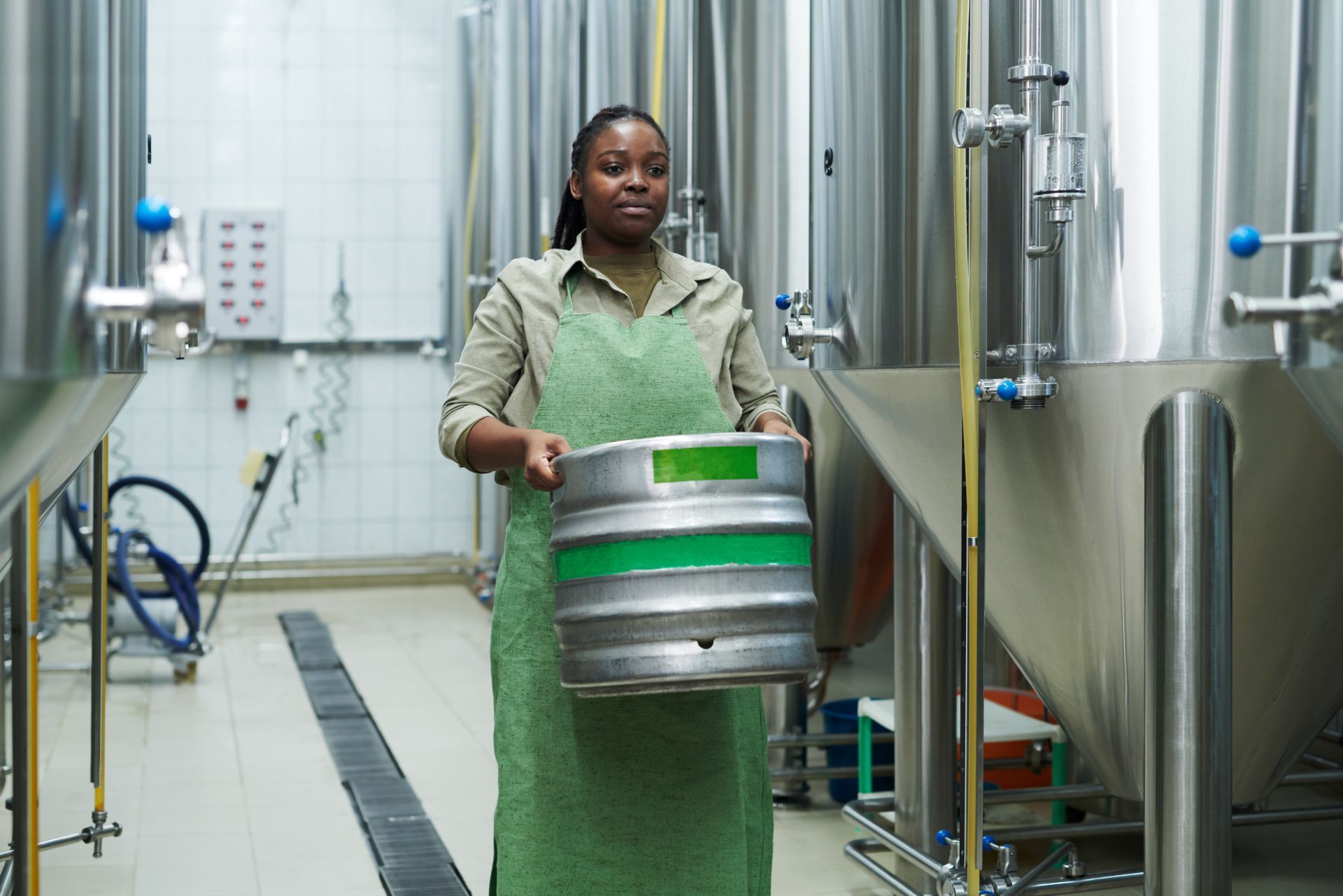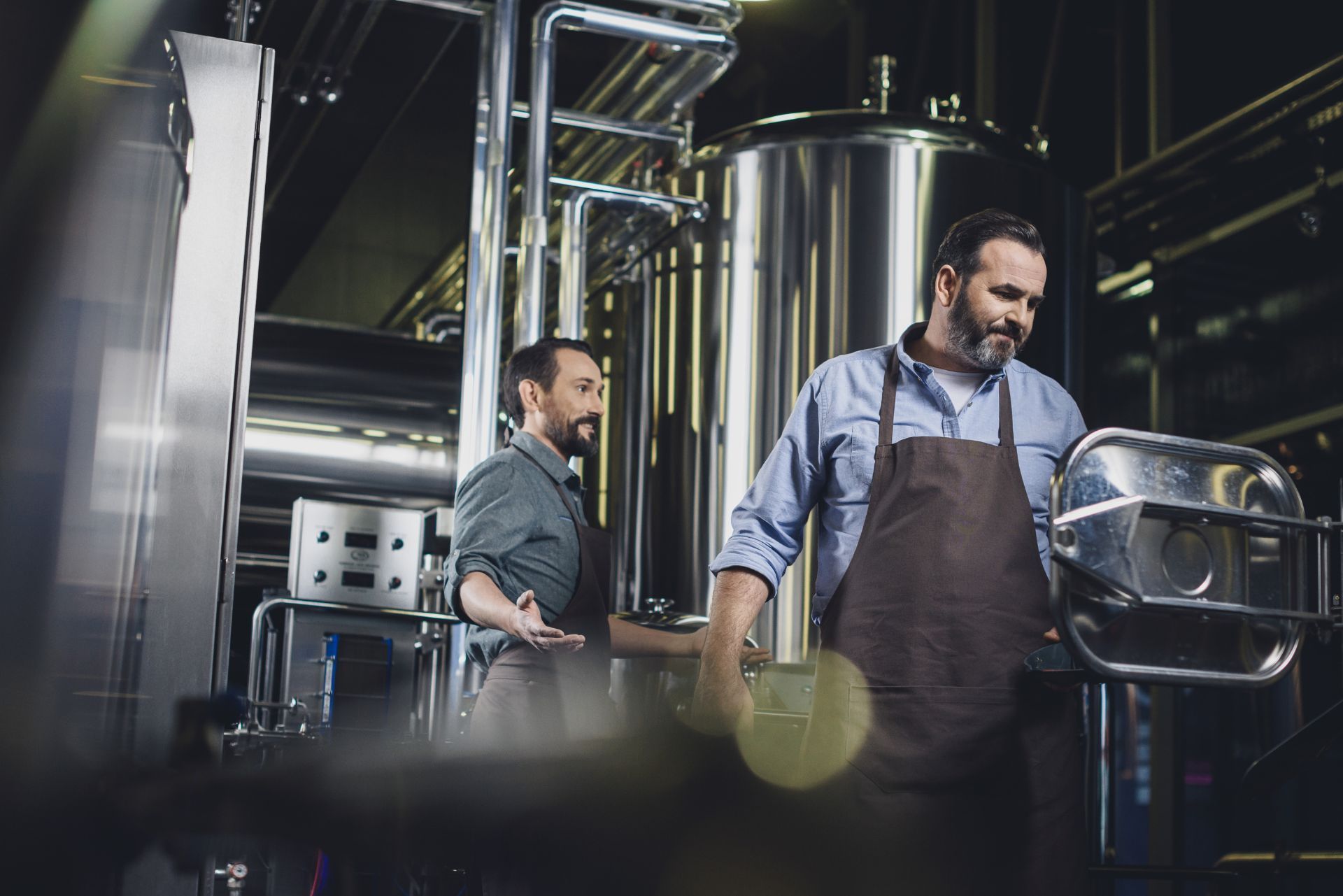Top 3 Recommended Policies

By: Lance Hale
Licensed Commercial Insurance Specialist
425-320-4280
The Pacific Northwest pours a world-class pint, and Washington State sits at the heart of that reputation. Whether tucked into Seattle’s urban landscape or spread across Yakima Valley’s hop farms, more than four hundred independent breweries now operate within state lines. Their collective economic impact eclipses two billion dollars a year, yet every mash tun and tap handle carries a unique blend of hazards—ranging from boiler explosions to slip-and-fall injuries in crowded taprooms. The right insurance program keeps those risks from souring hard-earned success. This guide distills everything Washington brewery owners, managers, and start-up founders need to know about protecting their operations, staff, and loyal patrons.
Washington’s Booming Craft Beer Scene
Growth has been relentless since the mid-2000s. According to 2023 figures from the Brewers Association, Washington hosts the second-largest concentration of hop acreage in the world and the fourth-highest number of licensed breweries in the United States. More than 24 million barrels of beer are produced nationally each year, and Washington contributes nearly six percent of that volume. Tourists plan entire itineraries around brewery crawls in Spokane, Tacoma, Bellingham, and the San Juan Islands. For insurers, that rising foot traffic translates into more exposure to liability claims and property losses—especially when tasting rooms double as concert venues, trivia halls, or wedding locales.
Economic influence extends well beyond tasting flights. Allied industry jobs in farming, logistics, glass manufacturing, and hospitality depend on brewers keeping the kettles firing. Each new brewery adds an average of twelve direct positions, from cellarman to marketing director. The ecosystem is vibrant, yet fragile. A single contamination incident or extended equipment outage can ripple across supply chains and payrolls. Understanding the local landscape clarifies why tailored insurance coverage is not optional but mission-critical.
The craft beer revolution in Washington is not just about the numbers; it’s also about the stories behind each brew. Many breweries pride themselves on sourcing local ingredients, creating unique flavors that reflect the region's agricultural bounty. From hop-forward IPAs that showcase the state’s renowned Yakima Valley hops to rich stouts brewed with locally roasted coffee, each pint tells a tale of collaboration between farmers and brewers. Events like the Washington Brewers Festival and the Yakima Valley Hops Festival celebrate this creativity, drawing beer enthusiasts from far and wide to sample the latest innovations and meet the passionate individuals behind them.
Moreover, the craft beer community is known for its spirit of collaboration rather than competition. Many breweries engage in creative partnerships, crafting collaborative brews that combine their unique styles and techniques. This camaraderie fosters a supportive environment where knowledge is shared, and new ideas flourish. Additionally, the rise of craft beer has spurred a renaissance in food pairings, with many breweries now offering gourmet food trucks or in-house kitchens that elevate the tasting experience. The synergy between craft beer and culinary arts is becoming a hallmark of Washington's vibrant food scene, enticing both locals and visitors to explore the best of what the state has to offer.
Why Breweries Face Unique Risks
Brewery losses rarely mirror those of a typical restaurant or manufacturing plant. High-pressure steam systems, carbon dioxide buildup, and flammable grain dust introduce industrial-grade dangers inside what many customers view as relaxed social venues. Add the volatile chemistry of fermentation, a steady flow of visiting trucks, and occasional can line jams, and you have a risk portfolio unlike any other small business. Claim history shows that mechanical breakdowns and spoilage alone can wipe out tens of thousands of dollars in product within hours.
Alcohol service amplifies exposures. Washington’s dram-shop laws hold breweries responsible if an overserved patron injures someone after leaving the premises. Meanwhile, distribution agreements may send cases across state lines, complicating jurisdictional liability. Cyber-threats are quietly rising too; online ordering and membership clubs store payment data that hackers crave. The multifaceted nature of these risks explains why breweries often need a dozen separate policy endorsements rather than a one-size-fits-all package.

The Core Insurance Policies Every Washington Brewery Should Carry
General Liability
General liability functions as the backbone of any brewery insurance portfolio. It covers bodily injury, property damage, and personal or advertising injury claims stemming from everyday operations. If a visitor trips over a hose on a brewery tour or a competitor alleges copyright infringement over a tap-handle design, general liability responds. Washington juries are known for sizable verdicts—median premises-liability awards top $250,000—so most brokers recommend at least two million dollars in combined single limits for breweries that host public tours or events.
Liquor Liability
Unlike many states, Washington requires a separate liquor liability policy (often called dram-shop coverage) for any business selling or serving alcohol on premises. A standard general liability policy specifically excludes alcohol-related incidents. Liquor liability pays legal fees, settlements, and medical bills if an allegedly intoxicated patron causes harm after leaving the brewery. Limits should track both taproom volume and off-site event activity; festivals and collaboration dinners increase exposure. Some insurers now offer assault-and-battery sublimits to address fights that break out inside taprooms, a coverage wrinkle worth requesting.
Commercial Property
A fire in the grain room or a burst water line in the cellar can halt production for months. Commercial property insurance reimburses for physical damage to buildings, inventory, and improvements. Because breweries often lease industrial spaces then add tens of thousands of dollars in build-outs—from glycol loops to ornate bars—accurate replacement cost valuations are critical. Pay special attention to the policy’s spoilage and temperature fluctuation extensions; Washington’s winter power outages routinely trigger claims for frozen pipes and ruined wort.
Equipment Breakdown
Boilers, chillers, and canning lines are the lifeblood of brewery operations, yet they also rank among the most frequent sources of loss. Equipment breakdown coverage—sometimes packaged as Boiler & Machinery—pays for sudden mechanical or electrical failures and the resulting business interruption. Without it, a cracked heat exchanger could require a six-figure outlay before brewing resumes. Many Washington carriers now bundle green-energy upgrades, allowing brewers to replace outdated units with more efficient models at little additional premium.
Workers’ Compensation
From steep staircases around fermenters to caustic cleaning chemicals, breweries pose many dangers to employees. Washington operates a state-funded workers’ compensation system through the Department of Labor & Industries, yet private stop-gap coverage is often needed to fill employer-liability gaps when operations expand into other states. Common brewery worker injuries include back strains from lifting kegs and burns from boiling wort. A single lost-time injury averages more than $42,000 in direct and indirect costs, making safety programs and wage-replacement benefits essential.
Commercial Auto
Even if distribution is contracted out, breweries typically use branded vans for keg deliveries, mobile can sales, or festival transport. Personal auto policies exclude business use, leaving the company on the hook for property damage and bodily injury settlements. Commercial auto insurance can also cover hired and non-owned autos when employees rent vehicles or drive personal cars on company errands. Adding a motor carrier endorsement becomes necessary when serving statewide grocery chains that demand proof of higher liability limits.
Cyber Liability
Online beer clubs, gift-card portals, and point-of-sale systems store a trove of customer data. In 2022 a Seattle microbrewery lost nearly $50,000 paying ransomware extortionists who encrypted its inventory database the night before a major release. Cyber liability policies cover data-breach notification expenses, forensic IT services, legal defense, and even reputational damage mitigation such as PR consulting. Because Washington’s Privacy Act requires swift consumer notice, time triggers in cyber policies should be reviewed carefully.
Product Recall and Contamination
Wild yeast, excess diacetyl, or a mislabeled allergen can turn an acclaimed double IPA into a public-health hazard. Product recall insurance reimburses the cost of pulling contaminated batches from shelves, destroying stock, and communicating with retailers and regulators. Washington’s Department of Agriculture can mandate public recalls if lab testing detects pathogens. Policies often bundle coverage for government recall fees and third-party liability claims, a lifesaver for breweries distributing across multiple states through the Three-Tier System.
State-Specific Regulations and Insurance Requirements
While federal agencies such as the TTB and FDA set broad production standards, Washington imposes its own licensing framework through the Liquor and Cannabis Board (LCB). Proof of liquor liability insurance is typically required before a new brewery can receive a domestic brewery license. Local fire marshals in King and Pierce counties now demand evidence of adequate property-and-boiler coverage before issuing occupancy permits for facilities larger than 10,000 square feet. Pierce County also requires a pollution control plan for wastewater discharge, and insurers may exclude losses stemming from permit violations.
Washington’s workers’ compensation regulations differ from neighboring Oregon and Idaho. Because the system is monopolistic, businesses must buy L&I coverage directly from the state fund, yet out-of-state expansion calls for separate private policies in those jurisdictions. Noncompliance results in steep penalties: in 2023, the LCB suspended three breweries for operating taprooms without valid coverage, costing them an average of $18,000 in fines and lost revenue. Staying on top of these state-level nuances keeps premium dollars from being wasted on uninsurable exposures.
Calculating the Right Coverage Limits
A rule of thumb is to mirror annual gross sales when setting product liability limits, but Washington’s premium market rewards accurate data. Carriers examine production volume, average ABV, barrel-to-package ratios, and event frequency. Breweries participating in more than ten off-site festivals per year often elevate their general and liquor liability limits from two to five million dollars, sometimes through a commercial umbrella policy. Property limits should reflect replacement cost, not depreciated book value, especially in Seattle where industrial real estate prices have soared nearly 20 percent since 2020.
Business income coverage is equally vital. Determine how many days it would take to repair or relocate a damaged brewhouse, source replacement tanks (lead times can stretch past 26 weeks), and resecure distribution contracts. An extra expense endorsement, which pays to rent mobile canning lines or alternative production space, can be a lifeline. Collaborating with a broker who understands tank depreciation schedules and leasehold improvements keeps valuations realistic and premiums efficient.
Real-World Claim Scenarios From Washington Breweries
Yakima Valley Glycol Leak: A ruptured glycol line at a 15,000-barrel facility spoiled 220 barrels of lager and shorted out the chiller. Equipment breakdown insurance covered the $145,000 repair, while spoilage coverage reimbursed lost product revenue. The incident also illustrated the value of business interruption insurance; the carrier compensated payroll and utility costs during the three-week outage.
Seattle Taproom Slips: A patron slipped on a recently mopped concrete floor, sustaining a fractured wrist. Medical bills and legal fees totaled $78,000, which the brewery’s general liability policy paid. Defense costs alone approached $30,000 because video evidence was inconclusive and the claimant alleged inadequate warning signage.
Spokane Can Recall: A miscalibrated seam on a mobile canning run allowed oxygen ingress, causing secondary fermentation and bulging cans. The brewery issued a voluntary recall, paying $24,000 in freight and disposal fees plus $18,000 in retailer chargebacks. Product recall insurance reimbursed both the direct costs and a $10,000 marketing campaign to restore consumer confidence.
Risk Management Beyond Insurance
Coverage is only half the equation; proactive safety culture reduces premiums and preserves morale. Implement daily checklists for hose placement, maintain clear walkways, and keep SDS sheets accessible to satisfy OSHA inspectors. Regular CO2 monitoring is critical; four Washington breweries received citations last year for readings above permissible exposure limits in cellar areas. Annual boiler inspections, mandated in most counties, often trigger insurance discounts when paired with documented corrective maintenance.
Employee training pays dividends. Certified Cicerone and Taproom Profit programs teach staff to recognize intoxication, reducing liquor liability claims. Food-grade chemical handling classes curb skin-contact injuries. Finally, cyber hygiene training—multi-factor authentication and regular data backups—has become just as vital as draining hot wort safely. Insurers routinely reward these efforts with lower deductibles and more competitive renewal quotes.

How to Choose an Insurance Partner
Brewers should look for agents and carriers that belong to trade groups such as the Washington Brewers Guild. Familiarity with specialized equipment, seasonal production swings, and collaboration releases leads to smoother claims handling. Carriers that offer loss-control visits by engineers familiar with craft brewing can pinpoint vulnerabilities and suggest facility upgrades that pay for themselves in premium credits.
Service quality matters as much as price. Ask potential brokers about turnaround time on certificates of insurance—especially important when booking last-minute festival booths—and their in-house claim advocacy track record. Request client references from breweries of similar size and distribution footprint. An ideal partner not only places coverage but also helps navigate label-approval issues, OSHA audits, and recall communications.
Frequently Asked Questions
Does a Washington brewery need insurance before the first batch is brewed?
Yes. Landlords typically require proof of general liability and property insurance upon lease signing, and the LCB will not issue a brewing license without liquor liability coverage. Policies can start with low limits during construction and scale up as production approaches.
Are festivals and pop-up events automatically covered?
Not always. Many policies limit off-premises pouring to a set number of events per year or require prior notice. Securing an event endorsement or separate special-events policy prevents coverage gaps when serving outside the taproom.
Can insurance cover barrel-aged beers that take years to mature?
Yes, but the carrier must schedule those barrels separately with agreed-upon value. Some insurers treat aging beer like fine wine or whiskey, accounting for increased value over time. Accurate inventory tracking is essential for claim payment.
What factors influence premium costs the most?
Annual production volume, prior loss history, taproom capacity, and the presence of a kitchen all play major roles. Implementation of sprinklers, fermentation gas monitoring, and robust employee training programs can lower rates by up to 15 percent.
Final Thoughts: Pouring Success With the Right Protection
From mash-in to final pour, Washington breweries embody craftsmanship and community spirit. The same passion that fuels recipe experimentation should drive meticulous risk planning. Adequate insurance—paired with strong safety culture and informed broker guidance—builds resilience against fires, lawsuits, and cyberattacks. Securing the right coverage keeps the focus where it belongs: innovating flavors, cultivating loyal customers, and ensuring every pint poured reflects the best of the Evergreen State’s brewing tradition.

